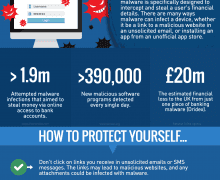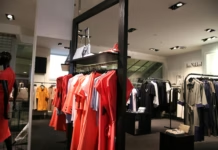In a recent report run by Action Fraud and the City of London Police, it has been found that Banking Malware accounts for 41 percent of recorded malware infections* in the UK. Banking Malware is a type of software used by cyber criminals to target online bank accounts and allows them to obtain personal and financial details.
A computer or mobile device may become infected if it doesn’t have sufficient anti-virus protection, regular patches or software updates applied. Once infected, a cyber criminal can remotely take control of the internal functions of the device. With this they can start to steal personal data and access online bank accounts, encrypting files and distributing malware to other computers.
When a person gets malware on their computer there is normally a financial cost involved. This may involve having to buy anti-virus software products to protect the device or paying a ransom to regain valuable data and files. Or for businesses they may experience a loss in revenue from a Denial of Service attack (DDoS) on the company’s website.
Computer users will unintentionally download malware by doing the following:
- Clicking on an infected file attachment in emails.
- Clicking on an infected website link.
- Clicking on an infected link whilst on a social media site.
- Inserting an infected removal drive into the computer.
- Downloading an infected file attachment on a text or via a mobile application.
How to protect yourself from Banking Malware:
- Don’t click on links you receive in unsolicited emails or SMS messages. The links may lead to malicious website and any attachments could be infected with malware.
- Only install apps from official app stores, such as Google’s Play Store, or Apple’s App Store. Jailbreaking, rooting, or disabling any of the default security features on your mobile device may leave it more susceptible to malware infections.
- When logging in to your online banking account, be extremely cautious if you’re asked for details such as the 3 digit (CVV) number on back of your card, the long number on the front of the card, your card’s expiry date, or the 4 digit PIN for your card. If the online banking login page you’re on does ask for those details, then don’t login until you’ve called your bank to verify that you’re logging in to a genuine web page.
- Your bank will never ask you to transfer money out of your account and into another. Fraudsters will. If you receive messages, browser pop-ups or calls asking you to do this, then don’t respond to them. Call your bank immediately.
What to do if your computer has been infected with malware:
- You can disinfect your computer for free by using software from providers such as Microsoft and Symantec. The disinfection tools will identify whether a computer has been infected and, if so, disinfect it. The tool will cause no harm if used on computers that have not been infected.
- If your computer has been affected you should change all of your passwords on banking, email, social media and other potentially sensitive online accounts.
City of London Police’s Commander and National Coordinator for Economic Crime, Chris Greany said:
“We live in an age where computers and mobile devices dominate our lives, both during work and play.
“Cyber criminals are increasingly using malware to access our financial details and are constantly adapting it so that they can try and get ahead of the security measures put in place by law enforcement and industry.
“Both the public and businesses need to be aware of this and accept that whilst it is safe to use online banking, they should follow our protection advice which will help them to avoid their online bank accounts being compromised”.
Article courtesy of South Wales Police.

| [donate]
| Help keep news FREE for our readersSupporting your local community newspaper/online news outlet is crucial now more than ever. If you believe in independent journalism,then consider making a valuable contribution by making a one-time or monthly donation. We operate in rural areas where providing unbiased news can be challenging. |



















